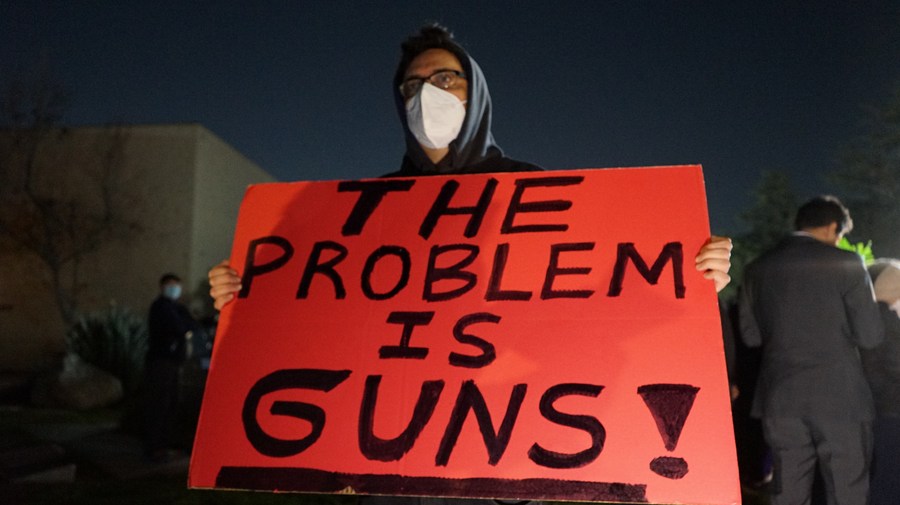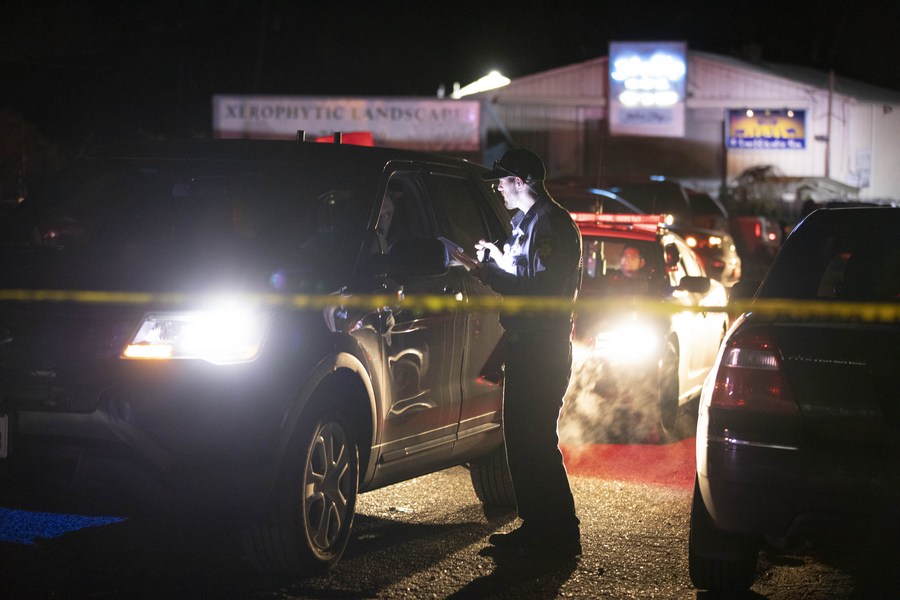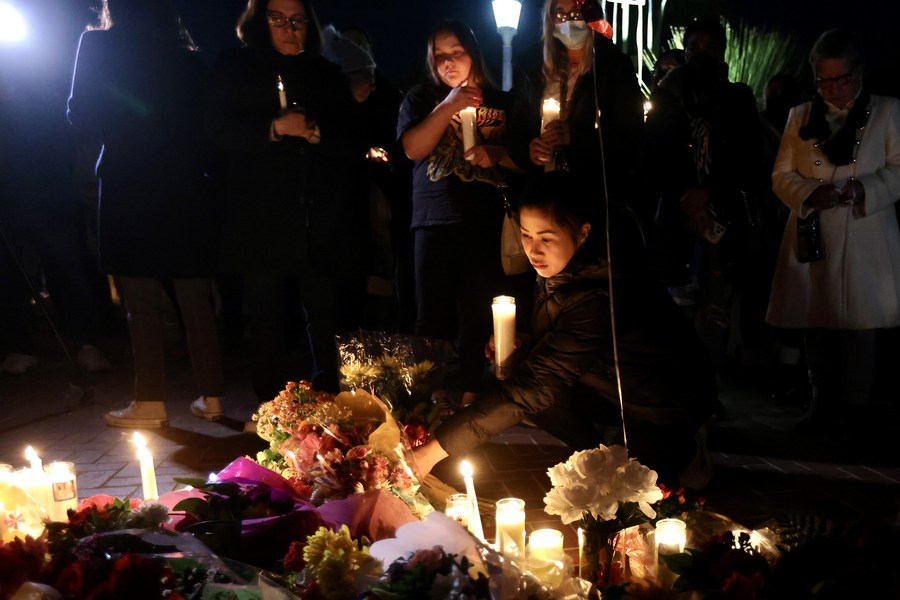Sadly, mass shootings are a daily affair in America

A man holds up a sign denouncing gun violence during a memorial for victims of a mass shooting at Monterey Park City Hall, California, the United States, Jan. 23, 2023. (Photo by Zeng Hui/Xinhua)
Since the start of the New Year, in just 45 days, there have been 78 mass shootings across the United States, or an average of 1.7 per day, leaving 129 dead and 294 wounded.
WASHINGTON, Feb. 14 (Xinhua) -- Three people were killed and five others were injured in on-campus shootings at Michigan State University (MSU) Monday night, with the suspect found dead from a self-inflicted gunshot wound, police said.
According to MSU spokesperson Emily Guerrant, the first shots were fired inside a hall at 8:18 p.m. local time (0118 GMT) at the north end of campus, and gunshots were later heard at a nearby hall.
"This is a complete nightmare we are living tonight," Chris Rozman, interim deputy chief with MSU Department of Public Safety, was quoted by CNN.
The tragedy was the 77th mass shooting in the United States in 2023, according to the Mass Shooting Tracker website, a crowd-sourced database of U.S. mass shootings.
On Tuesday afternoon, the 78th mass shooting followed in Pennsylvania. Four students were injured to varying degrees. The suspect is still at large.

A sheriff deputy works at the scene of a shooting in Half Moon Bay in California, the United States, Jan. 23, 2023. (Photo by Li Jianguo/Xinhua)
Since the start of the New Year, in just 45 days, there have been 78 mass shootings across the United States, or an average of 1.7 per day, leaving 129 dead and 294 wounded.
Figures also showed that the number of mass shootings across the country has been rising sharply, from 339 in 2013 to 753 in 2022 -- more than double.
Three weeks earlier, seven people died and one was critically injured in two shootings in the coastal northern California city of Half Moon Bay. Another 11 people were killed and at least 10 wounded in a shooting in Monterey Park in Southern California.
Shooting tragedies are a daily affair in the United States, with many fearing they could be caught up in the next mass killing.
"We have the highest rates of gun deaths in the world. We have more guns than people ... We have more than one gun for every man, woman and child in America. That is insanity," Paul Cole Padilla, an educational administrator, told Xinhua.
Many people blame mass shootings on race, but the reality is far more complicated. America's culture of violence runs deeper than skin color, and the single-minded focus on race won't solve anything, said Bill Maher, host of the HBO political talk show Real Time.
The culture of violence in the United States manifests on various fronts.
"Can American culture rethink itself -- can it transcend its belief that enemies are always out there, needing to be obliterated," said Robert C. Koehler, a Chicago-based journalist and nationally syndicated writer, adding that violence presents itself in people's imaginations, games, movies and defense budget, as consequence-free, instantaneous and necessary.

People mourn with candles for victims of a mass shooting in front of the city hall of Monterey Park, California, the United States, on Jan. 23, 2023. (Xinhua)
Last month, U.S. President Joe Biden urged Congress to "ban assault weapons once and for all." Still, Republicans remain steadfast in supporting gun rights and oppose more restrictions on carrying firearms.
Michigan Governor Gretchen Whitmer in January outlined an agenda to prioritize enacting stricter gun laws, calling for universal background checks, safe storage laws and extreme protection orders to prevent potential risk, The New York Times reported.
Although most Americans support more gun control laws, the efforts seem in vain. A viral image on social media sums up America's moral morass: "mass shooting happened, media extravaganza, thoughts and prayers, social media gun debates, no one actually does anything, back to 'normal,' another mass shooting happens."
Gun control has become a political asset rather than a problem that needs fixing.
"Americans who oppose gun control are more likely to contact public officials about it and to base their votes on it," explained Matthew Lacombe, associate professor at Case Western Reserve University and former researcher at Barnard College. "Many politicians believe that supporting gun regulation is more likely to lose them votes than to gain votes."
Photos
Related Stories
- 3 dead, 5 injured in Michigan State University shooting
- U.S. gunman killing 23 at El Paso Walmart pleads guilty to 90 charges
- California gun laws cannot stop mass shootings without federal support: The Guardian
- U.S. New Jersey councilwoman shot dead outside home
- People mourn victims of mass shootings in Half Moon Bay, the United States
Copyright © 2023 People's Daily Online. All Rights Reserved.









